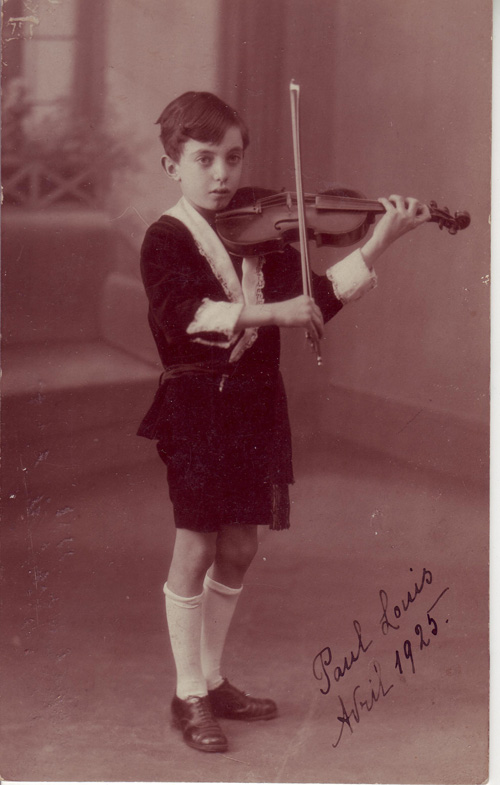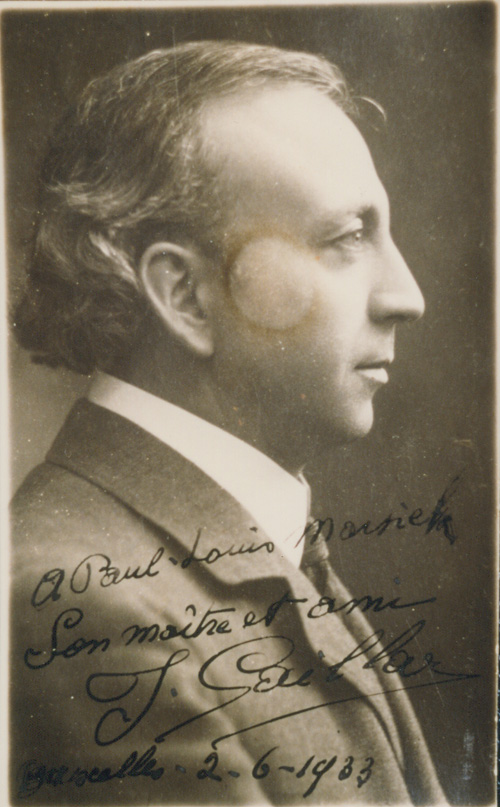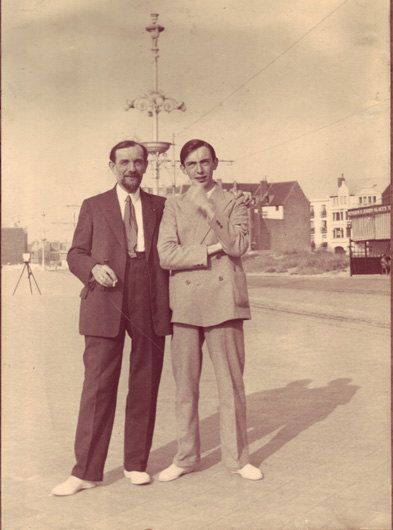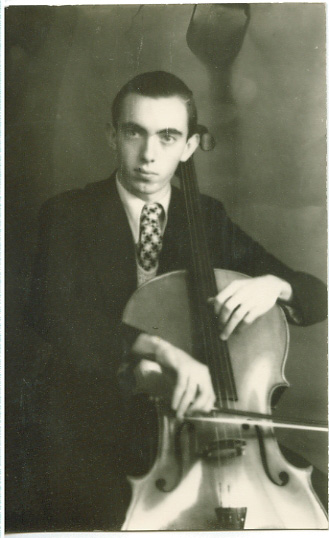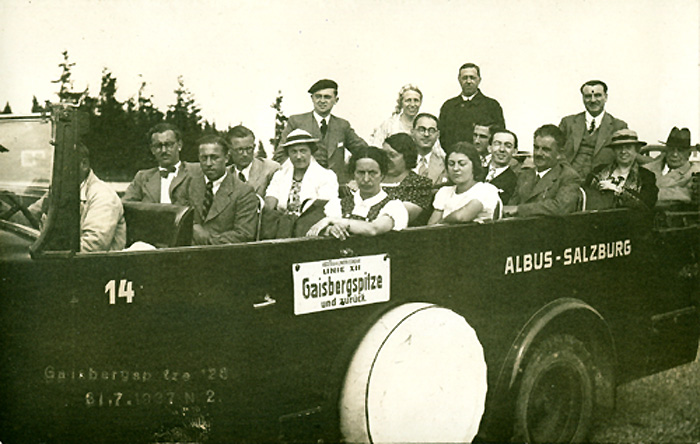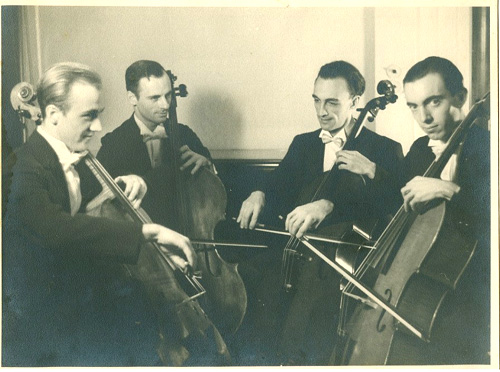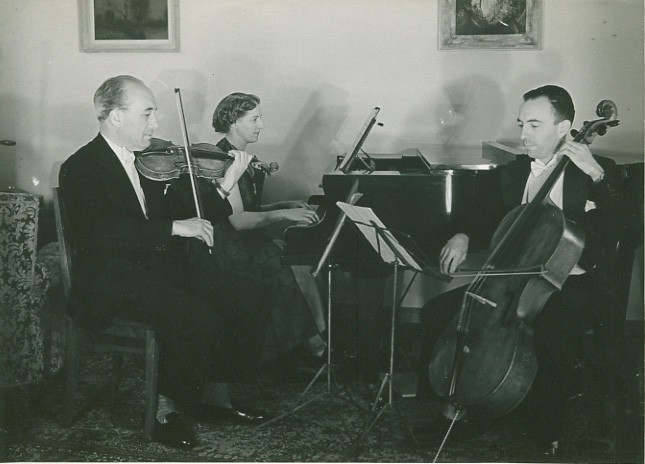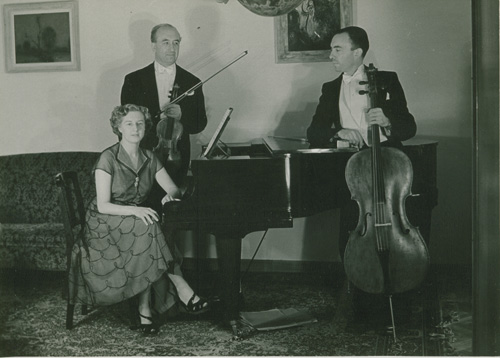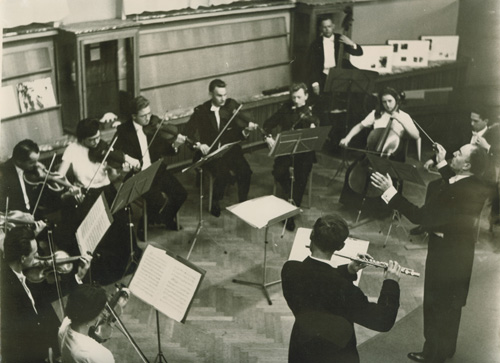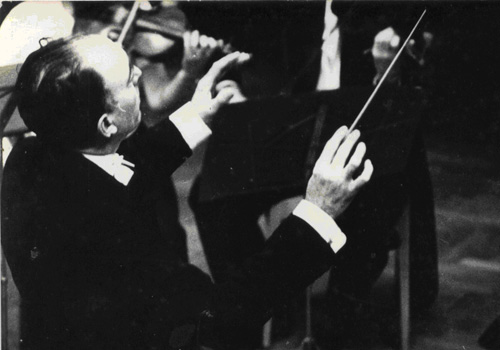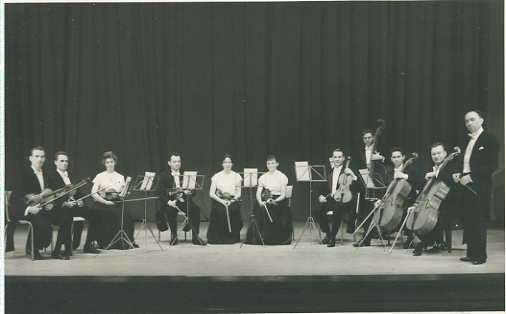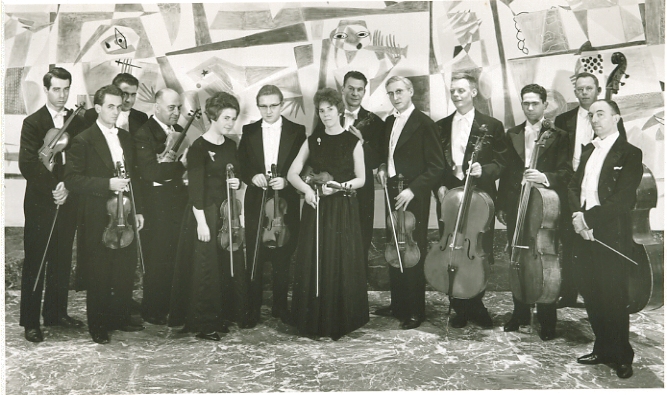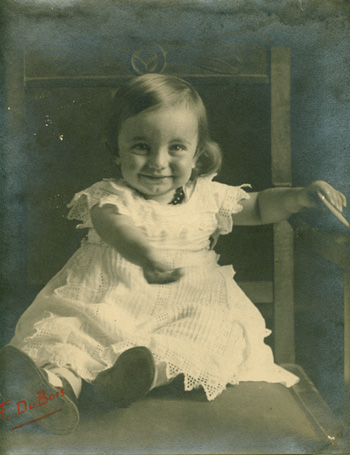
I't was at Old Phalerum, on the coast of the Aegean Sea and at the foot of Mount Hymettus that Paul-Louis Marsick was born on 9th February 1916. He was wont to say that Greece and the gods of Olympus had forged his destiny. He would often quote Baudelaire’s words: “As a free man you will cherish the sea”. He was to live the first eleven years of his life on the coast since, after that of the Aegean Sea, he was to live on the Gulf of Gascony, in Bilbao. His father, Armand Marsick, was at the time, Director Studies at the Athens Conservatoire and founder conductor of the Symphony Orchestra. His Italian mother was a good amateur painter. His parents were particularly attentive to his education. His grandmother, Edma Breton, Marchioness of Sampieri, was of considerable importance for him. Edma was a singer and had a promising career ahead of her before she married. Even though she had to abandon her dreams of being a performer, she continued to do her singing exercises every morning and Paul-Louis often spoke of the grandmother he loved dearly. In other words, he was born into an artistic background, with his grandmother who sang to him, his mother a talented painter and his father who lived only for music. At a very early age, he too was to become completely immersed in the music that proved to be vital for all the Marsicks, even today.
In 1922, he moved with his parents to Bilbao where his father had been appointed to the Conservatoire. Greece, Italy and then Spain ... Even though Bilbao is a long way from the Mediterranean it is still a southern country with a Mediterranean view of life. Paul Louis would always look towards the Mediterranean despite the fact that he was Belgian since his father, Armand, was Belgian, too !
 Spain
Spain
Of Greece he had hardly any memories. In January 1922, the family settled in Deusto, the part of Bilbao where Armand managed to find a house ... with no fireplace. They arrived in the throes of the Basque winter. The weather was dull ... but Paul-Louis was to have happy memories of the five years spent in Bilbao. He learnt Spanish very quickly … with a Basque accent and was enrolled at primary school which he attended for the duration in Bilbao. He spoke Spanish fluently and wrote it faultlessly. He thus became trilingual since his father and grandmother spoke to him in Italian. All through his life he maintained close links with his childhood friends. Later he came back to the city to conduct the orchestra founded by his father in 1922, and it was here, too, that he began his musical studies at the Conservatoire directed by his father. Naturally enough, his father gave him a violin. It was only on his arrival in Belgium in about 1928 that he chose the cello, very probably influenced by the elder brother of a fellow student at the Schaerbeck Athenaeum, Pierre Darcy.
He heard the many concerts played in Bilbao. First, those of his father conducting the Orquesta Sinfonica, and later chamber music too. He experienced all the moments of European musical life, met Jacques Thibaud, Arthur Rubinstein, Blanche Selva, Hector Dufrasne, the female concert singer Demougeot and many others.
The fine arts held an important place in his artistic training, as did literature. He read in Spanish: Calderon, Robinson Crusoe "explicadas a los niños" (explained to children), "la vida de grandes hombres" (the life of great men) such as Franklin or Dante and of course the lives of Cristobal Colón (Christopher Columbus), "Don Quijote de la Mancha para uso de los niños" (Don Quixote of la Mancha for children) and Cervantes. There were edifying readings, too, which were to forge the young Basque Spaniard which he might have become. Let it not be forgotten that Primo de Ribera imposed his dictatorship, during those years.
 Belgium
Belgium
Soon, however, in 1927 the family was obliged to move again. His father returned to Belgium. The family lived on the Chaussée d’Helmet in Brussels. He enrolled in the first form of the Schaerbeek Royal Athenaeum, in the east of Brussels. Near them in Boulevard Lambermont, lived a French family by the name of Darcy. The father created wall-paper for a large company.
They had three children: Cécile was a painter, Robert a cellist who won first prize at the Lyon Conservatory (which was later to become the Higher Conservatoire) and Pierre ... a scout. Scouting was to be a real school of life for Paul-Louis. Robert was to have a great influence on the young Paul-Louis and it was doubtless he who made him give up the violin for the cello. Paul-Louis was little interested in classical studies. He only liked history and French and was far too much taken up by his musical studies. At the end of third form he left the Athenaeum definitively and enrolled at the Brussels Royal Music Conservatoire and joined Jacques Gaillard’s cello class – a remarkable teacher.
Paul-Louis held him in great admiration and if the writer of these words is named Jacques, it was out of affection for his teacher that Paul-Louis gave him this first name. From then onwards Paul-Louis’ progression at the Conservatoire was exemplary and he acquired a very thorough training.
 The Royal Conservatory of Music, Brussels.
Course of study
The Royal Conservatory of Music, Brussels.
Course of study
As early as 1933, he obtained the first prize in History of Music with great distinction in the class of Ernest Closson, one of the greatest European musicologists, of whom he was to become very fond. The prize later enabled him to obtain two scholarships – one for a stay in Salzburg and the other in Italy.
At the end of the Second World War, he wrote several biographical articles on a number of musicians and, under the auspices of Closson, longer monographies on Rossini and Grétry. He also made commentaries on all of his concerts and those of the “Jeunesses Musicales” (Musical Youth) without using notes. This musical culture was reinforced by his yearning for general culture which he felt was indispensable : literature, painting, architecture ... To his mind, all three were linked. It would be safe to say that he represented the very example of “the honest man” of the XVIIIth century. In 1934, he received the first prize in harmony in the class of Fernand Quinet, another great Belgian master. In 1935 he received the first prize for cello in the class of Jacques Gaillard with distinction, in 1936 the first prize for chamber music in the class of Wagemans, and a second prize for counterpoint in that of Raymond Moulaert. Finally in 1938, he received the first prize for fugue in the class of Léon Jongen. To this very complete training, we should also add that he took a class in orchestra conducting with René Defossez.
 The Cellist
The Cellist
Paul-Louis Marsick had very quickly become aware that he would never reach the heights of virtuosity needed for a career as a soloist. He did, however, have a passion for chamber music and for a long time hoped to be part of a string quartet which rightly represented for him the most complete of musical groups. He was to have the opportunity, before the war, to read a huge range of literature for string quartets thanks to an excellent amateur, whose name has not unfortunately been recorded, and who did not dispose of the time to work on the music but who wished to familiarise himself with as many works as possible. The quartets of Haydn, Mozart and Beethoven and many others were systematically explored. Paul-Louis had excellent memories of them. His father had him play as a soloist at Verviers and with the cellists at the “Exposition de l’Eau” (The Water Exhibition) in Liège in 1939.
His greatest experience before the war was the creation of the « Brussels Cello Quartet », which he founded in 1935. Along with Paul-Louis, other cellists included Robert Darcy, Franz Degroot and J. Vanderperen. The repertoire included: - arrangements by Robert Darcy: - sonata n°2 for four cellos by Carl Philippe Emmanuel Bach - concerto n°2 for four cellos and orchestra by Handel, - works specially written for this original quartet - "Divertissement" in four movements and a concerto for four cellos and orchestra by Robert Darcy - la "Rhapsodic Fantasy for four cellos" op.21 by Jean Absil. – other works for four cellos by Henri Challan, Seguito Intimo, dates unknown, and two pieces for four cellos by Joseph Jongen. op.89 written in 1929.
The string quartet was invited to the "Exposition de l'Eau" in Liège in 1939. But war broke out and interrupted the activities of the quartet. During the war, after the exodus into south-west France in 1940 then his return to Brussels in 1943, he played cello both for the Radio Symphony Orchestra and the Belgian National Orchestra, thus replacing the cellists held prisoner in Germany. The return of the prisoners deprived him of these posts.
In 1953, he became cellist for the Hainault Trio founded by the violinist Maurice Onderet from Mons on his return home from a long stay in Montreal, Canada. The excellent pianist, Edith Nisol, completed the trio. They gave dozens of concerts both in the Hainault area and elsewhere in a short lapse of time. However, the trio was to have a relatively short existence. Its activities were to last until summer 1956 when Paul-Louis had a car accident in the Gers with dramatic consequences. A double fracture of the left forearm and an unsuccessful operation in Agen prevented him from completely recovering the use of his forearm. As a result he had to give up the cello.
 The war.
The war.
Flashback: After months of «drôle de guerre", (“the phoney war”) from September 1939 to May 1940, the German army suddenly invaded Belgium on 10th May.
The Belgian army was unable to resist the armoured divisions and the parachutists which in a matter of hours overran the strongholds of Liège, considered to be impregnable. What was to be done? Paul-Louis had been exempted but he had a strong sense of duty. He met up with some scout friends when in Brussels and on 14th May he left with them for France in the hopes of forming a division to fight the Wehrmacht. On the 17th he was in Montpellier, and then went to Villeneuve-lès-Maguelone, to a camp specially set up to receive them. The division was never created due to lack of arms. He tried to join the French army, with no more success. Meanwhile, since the postal services were operational despite the fighting, he maintained correspondence with a distant cousin whom he had met on several occasions. He did his utmost to persuade Andrée Protat and her mother Marie Protat to join him in Montpellier, which they did. Very soon Andrée and Paul-Louis became engaged and Andrée would never remove the ring which sealed their love …
On 25th June, the fighting ceased. The shameful armistice signed by Pétain divided France into two zones. The repatriation of the Belgian scouts began, but Paul-Louis stayed on as his destiny was linked to his fiancée. Where should they go? They decided to join the family of Georges Protat, Andrée’s youngest brother, in the Gers. They finally settled in Mézin (Lot-et-Garonne) after various trials and tribulations and married there on 28th April 1941. Paul-Louis’ parents begged him to return to Brussels, as did his grandmother. Easier said than done ... He had to wait for the occupation of the southern zone for the Germans to authorise him to go to Brussels with his family. They arrived there on 27th June 1943. Paul-Louis found work replacing cellists in two symphony orchestras in Brussels: the radio orchestra, the INR and the Belgian National Orchestra. Thanks to this activity, he escaped Compulsory Work Service. Brussels was liberated by the British forces on 3rd September 1944. The prisoners returned home later and the musicians went back to their work. Paul-Louis was unemployed. He then accepted badly-paid tours or work in cafés which did not as yet have juke-boxes! Andrée alone brought in regular income by teaching French at the Lycée Français in Brussels, located near the Midi station. When their third child was born in March 1945, the question was what to do now?
 Teaching
Teaching
The only means of « earning his bread and butter », as he said, was teaching. Salvation first came from the music schools of Etterbeek, Brussels and finally of Braine-le-Comte where he taught the cello then at the Royal Athenaeum at Uccle in 1947. In 1948 he held temporary posts at the Morlanwelz athenaeum and at the Teacher Training College. He had to choose between the provinces and the capital, but the prospect of a permanent appointment at Morlanwelz with its dual post weighed heavily in the balance. The move took place at Easter 1949 to Familleureux. The writer of these lines was torn between the wonder of living in a huge, comfortable house and the eternal regrets of leaving Brussels as this village was lost in the middle of nowhere. Paul-Louis Marsick bravely underwent the course, going through the different levels leading to a teacher’s degree (the highest level in Belgium) with top marks. In 1954 he bought a small Volkswagen, the famous Beetle, thanks to the parsimonious generosity of an uncle who advanced the funds ... All the family boarded the car! The parents in front, the three elder children on the back seat and the twins, born in 1947, face to face in the little boot behind the back seat. A roof rack carried a trunk, and a net stretched between two metal bars above the seats was full of luggage, not to mention the boot at the back lined with household linen ... for the greater comfort of the “twins”. From then onwards, on Sundays, the car headed for Brussels to the grandparents’ house. The greatest emotion would be Andrée’s tears when they crossed the French border at Bois-Bourdon and she saw the large sign “France” on the road to Maubeuge ...
A t the Athenaeum and the Teacher Training College, Paul-Louis attempted to educate generations of schoolboys in music. Many of them have fond memories of his lessons and remember his cello which he played in class, his first 33 rpm LPs and discovering composers. There are many very moving accounts.
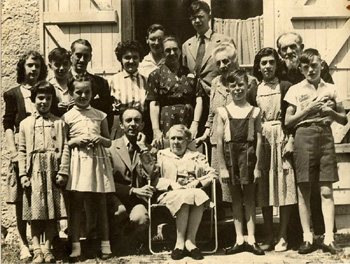 Click to enlarge
Click to enlarge
with the Protat family - summer 1957
(Click to enlarge)
Very soon he formed a choir. Rehearsals took place in the morning before class or during the lunch break. The choir performed at least twice a year for the APC (Central Provincial Athenaeum) festivals, in winter at the girls’ high school next door, and for the “Fancy Fair” at the Ascension. The repertoire ranged from the Renaissance, with pieces by Roland de Lassus, to negro spirituals and Czech folk music with "Tece Voda", for example and innumerable cannons! The practice of choral singing was but one aspect of Paul-Louis Marsick’s teaching methods. His classroom was also a permanent exhibition of musical instruments, photos and reproductions of pictures and illustrations of composers. Finally on 15th October 1951, Paul-Louis Marsick presented the first concert by the “Musical Youth Centre” which he had just founded. But before this he was to make a long journey to Italy, thanks to a scholarship from Princess Marie-Josée, from which he brought back important research work on the composer Francesco Antonio Bonporti (1672-1748).
 The Musical Youth Center
The Musical Youth Center
During the 50s and 60s, dozens of concerts were offered to the pupils of schools in the Centre, an industrial region which stretches around La Louvière, between Mons and Charleroi. Dare one say that this was one of the rare means of escape from these rough landscapes of mine shaft heads, slag-heaps, furnaces and metallurgy plants? Success did not dwindle thanks to the energetic leadership of Paul-Louis Marsick who was always well seconded by strong and committed teams. Jacques Lefèvre, a history teacher at the APC, his wife, Jean-Marie Sente, André Bougard and many others. Each school had its class leaders who were in charge of recruiting their school friends.
A whole team of youngsters greeted the public and prepared the receptions which took place after the concerts at the Provincial Institute of Arts and Trades at La Louvière and later on at the new La Louvière theatre – a very fine hall with perfect acoustics. Léon Fleischer, Pierre d'Archambeau, the choir of the « Maîtrise de la RTF » directed by Jacques Besson who was to be seen in the summer in the south-west with his incredible American partner. Jaime Laredo, Tamás Vásáry who would later become a householmd friend and who preceded his concerts with an hour of yoga! The Pasquier “children”, the youngest of whom was a cellist and whose feet didn’t reach the floor as he was still very small, folk groups such as the ballets from Brno or from Andalusia; jazz, too, such as the American trumpeter who swallowed the contents of a whole bottle of whisky during his performance ... and died shortly afterwards! But how he could blow! The very walls trembled! And, of course, Paul-Louis Marsick himself was at the head of many orchestras.
Many of these performers stayed at Paul-Louis Marsick’s home. This was an occasion to listen to them in private. The cellists were particularly well cared for, such as Guy Fallot, Maurice Gendron ... and his pianist, Jean Français. The children were deeply marked by these extraordinary occasions. They were completely mobilised at dealing with the printing of programmes on a stencil machine which printed one sheet at a time! They definitely lived on another planet, far from the normal studies of studious pupils! Above all there should be no regrets about these beautiful moments!
 The IPEL
The IPEL
When Paul-Louis arrived in Morlanwelz, he immediately made friends with a remarkable French teacher, Louis Philippart. This teacher would soon be called to a higher function: that of Director of the Provincial Institute of Education and Leisure. This institute was born in 1945 of a Provincial Commission of “Workers’ Leisure created in 1919. The vocation of this institute was therefore to offer factory workers and miners the facility to access culture with a capital C. One of the sections of the institute was devoted to musical art, subsidising, in particular, instrumental and choral societies from the provinces. As soon as Louis Philippart became director, the institute multiplied its big cultural events, notably the theatre by hiring the best Parisian theatre companies as in 1954 for an unforgettable series of plays by Racine. There would also be innumerable exhibitions, conferences, and the creation of a library which very soon became a remarkable tool for the dissemination of books with the purchase of a library bus ... The music section would be directed by Paul-Louis Marsick, a sometime stormy accomplice of his friend Louis. Paul-Louis chaired all the panels which judged the artistic quality of the brass and other bands of which there were many in the province. This was always on Saturdays and Sundays. He also gave many conferences even at the “Maisons du Peuple” (Houses of the People) in the smallest communes, in the factories when they accepted to open their doors to him. There would also be classes for the future librarians in Tournai, Mons and Charleroi. He also wrote several articles for the IPEL review “Rencontres”. In short, a life lived at 100 mph – as if he felt that his time was counted. All the more so when to his activities was added that of harmony teacher at the Royal Conservatoire in Mons in 1962.
 The Musician. The MARSICK Instrumental Ensemble.
The Musician. The MARSICK Instrumental Ensemble.
We might almost forget that he was first and foremost a musician. Paul-Louis Marsick was unable to play the cello after 1956 and turned to conducting. It was in this field that he excelled most. Very soon he was recognised as a conductor of great talent. His first performances were with the Brussels "Musica Viva" orchestra. With them he performed several dozen concerts. But this was not his orchestra. It took several years for his project to mature: that of creating his own orchestra. To do this he gathered instrumentalists who had all won first prize of the Royal Conservatoires, essentially those of Mons. In January 1962 he founded the “MARSICK INSTRUMENTAL ENSEMBLE”. The first concert took place at Manage on 5th May, where his family would live from then on. It was completely successful. Within a few years they performed 120 concerts, a good half of which took place in schools (in technical, middle and high schools), wrote Jacques Stehman in the evening newspaper “Le Soir” on 14th February 1969 in a long interview with Paul-Louis Marsick, who added “we always established a dialogue with our listeners and we were called back to the same venues: schools, workshops, cultural centres, workers’ clubs, youth clubs and local musical societies. Sometimes we were also invited to play in halls frequented by the ‘bourgeoisie’”. They thus regularly attended the Chimay festival.
The orchestra’s repertoire ranged from Corelli to contemporary composers such as Hindemith, Britten and Bartók. He did not neglect the Belgian composers, such as René Bernier, for example. His conducting was clear and very musical, his attacks always very precise. Each player did his or her best and, as a whole, formed a musical ensemble equal to the best orchestras in the kingdom. But he did not receive the official recognition that he hoped for, that was to make this orchestra the permanent orchestra of the Province of Hainault. This greatly distressed him. The negligence and lack of foresight of the politicians of the time were alone responsible for this.
Parallel to conducting his orchestra, he regularly conducted the National Radio Chamber Orchestra (the INR, later to become the RTBF), the Belgian National Orchestra (the ONB) until the jealousy of the official conductor barred the way to this dangerous competitor, and the Philharmonic Orchestra of Liège, whose young spirit, full of fervour he particularly appreciated. He gave many concerts in France, in the Nord-Pas de Calais region in particular. He also returned to Bilbao to conduct the orchestra founded by his father. He made two records: one with the ONB, the other with the Marsick Instrumental Ensemble. But in 1962 he was struck down by illness. He fought against cancer for seven years. On the 30th April 1969, exactly ten years to the day he died in the most atrocious pain. He rests in the town cemetery of Manage. He was aged 53 years.
 By way of conclusion
By way of conclusion
Paul-Louis Marsick was a musician - a real one. He was demanding on himself and on others with an uncompromising character and was not always easy to live with. He was curiously an active pessimist. Life had not always been easy for him – which explained his attitude. He was immensely cultured and left the memory of a genuinely passionate artist both with his students and musician colleagues and of course his children.
Jacques et Xavier MARSICK
Spring 2012
 version française
version française english version
english version Nederlandstalige versie
Nederlandstalige versie